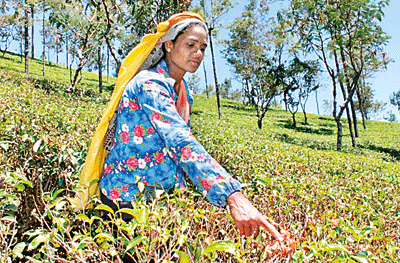Agriculture production slides as crops affected by pesticides and weedicides ban

Tea estates like this have been affected by both less rain and less fertiliser use.
Sri Lankan agriculture production of certain crops has dropped sharply this year owing to the ban on pesticides and weedicides with experts warning of a situation where the country’s food security is at stake.
Top level agricultural research scientist professionals (Members of the Sri Lanka Organisation of Agriculture Professionals (SLOAP)) raised this issue at a media briefing last week in Colombo. They say banning chemical fertiliser and widespread campaigns carried out against the use of these material has reduced agriculture production in
Sri Lanka.
The media briefing organised by the SLOAP explained scientific facts on various recent issues related to agriculture in Sri Lanka and focused on the use of agro-chemicals, food security and impact of inappropriate agricultural practices on the environment and human health.
Dr. Parakrama Waidyanatha, a member of SLOAP and an agricultural research scientist with long years of experience, showed how far the non-usage of the chemical fertiliser in the short period had affected some varieties of agricultural produce.
Quoting data from the Central Province Agricultural Department, he said maize production had fallen this year so far by 20 per cent when compared with 2105 output, ulundu was down by 31 per cent, chillies by 24 per cent and kurakkan by 55 per cent.
With regard to the Glyphosate weedicide ban, he said that there is no scientific base to indicate that this chemical is the root cause of kidney disease and said that an international workshop organised jointly by the World Health Organisation and the Presidential Task Force on the prevention of kidney disease held last April concluded that there was no scientific base to indicate that agro-chemicals is the root cause for this disease.
Quoting Prof. Bombastus von Hohenheim, founder of toxicology, Dr. Waidyanatha said that while all substances are poisonous and nothing is not poisonous, the level of poison is ascertained by the quantities used.
Dr.W. M. A. D. B. Wickramasinghe, a former Additional Director of Research, Department of Agriculture, Peradeniya, said that fertiliser is used for plant growth to provide nutrients and fertiliser use should be balanced as soils are poor in fertility due to continuous cultivation.
Explaining toxicity in fertiliser, he said not only in chemical fertiliser even in organic fertiliser there is a toxic content. He said the problem arises when farmers use too much fertiliser like in potato cultivation where some farmers use around seven times more than the required and prescribed quantity.
He said that there are 17 essential plant nutrients and without them a plant is unable to complete its life cycle, while function of one essential element cannot be replaced by another.
Implying that the scientific research based composition of fertiliser use has immensely helped human life, Dr. Wickramasinghe indicated that in 1940 Sri Lanka’s population was 6 million and 60 per cent of rice was imported. Then paddy cultivation in the country was with traditional varieties without any agrochemicals and the life expectancy was only 46 years.
But today – in 2015 – life expectancy is 74.3 years with food production based on well researched agrochemicals. He said that this vast improvement in the life expectancy and other pluses in food production are due to the improved research and extension services, improved food and nutrition status, improved adaptation of modern technology, improved health and education.
To get the same yield from agrochemical-based production, a large amount of organic fertiliser has to be used and invariably the same amount of toxicity is in the large quantities of organic fertilizer, he pointed out.
The presentations were moderated by Prof K. Samarasinghe, President, SLOAP and Prof. in Animal Science, Faculty of Agriculture, Peradeniya University.


